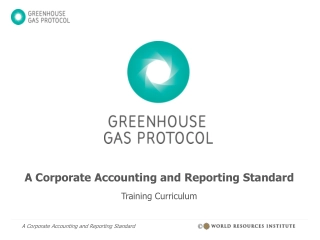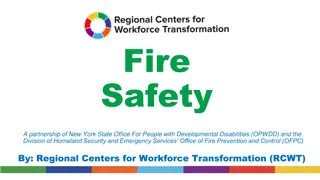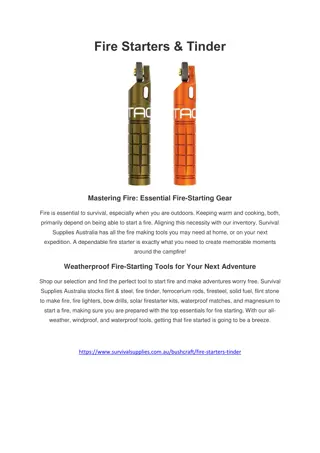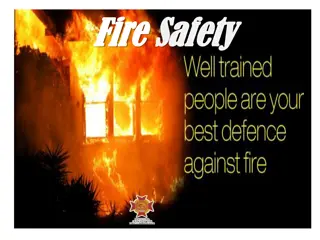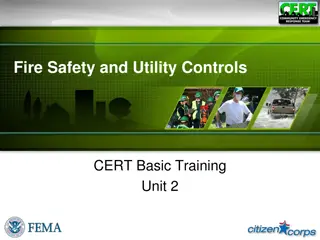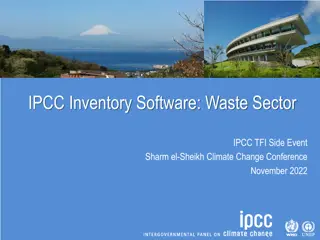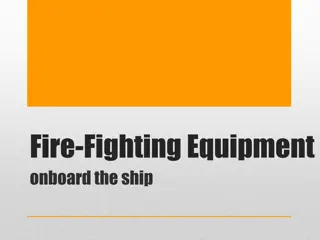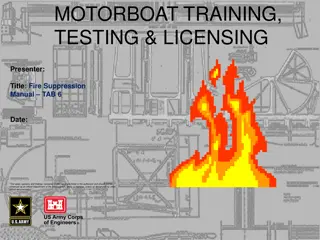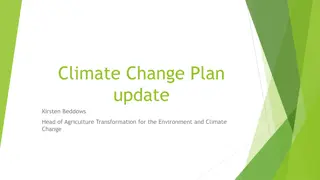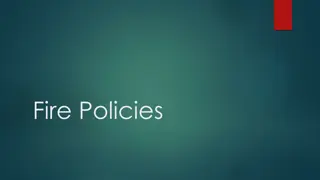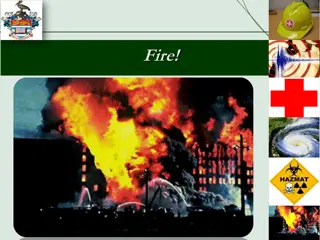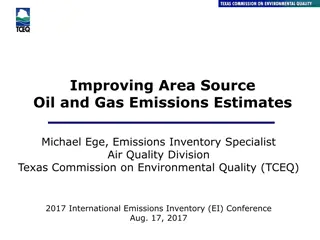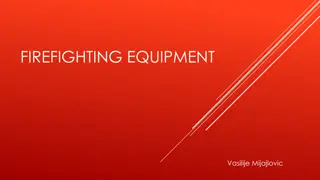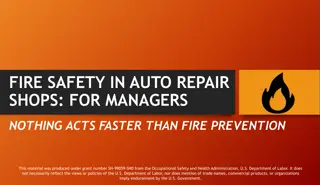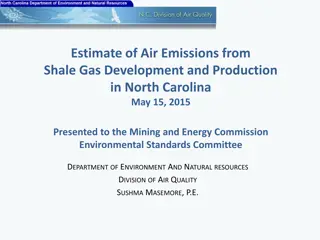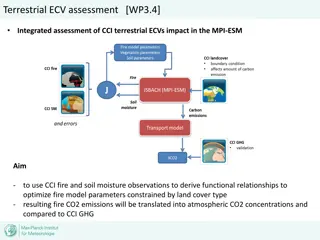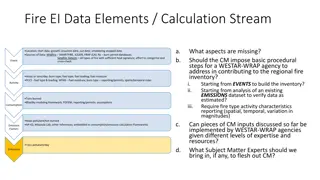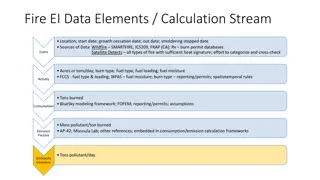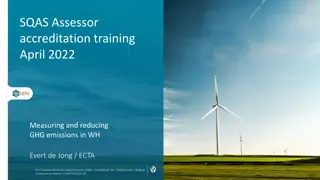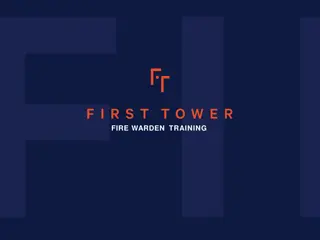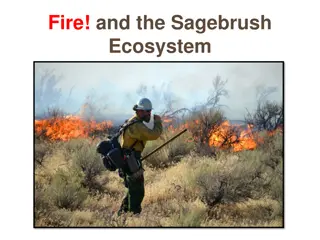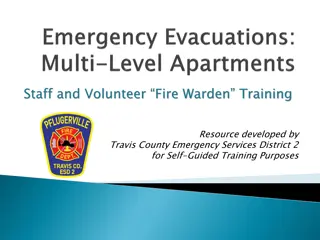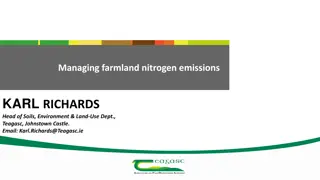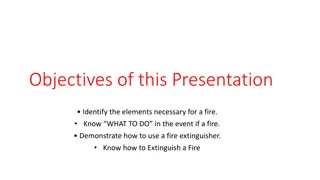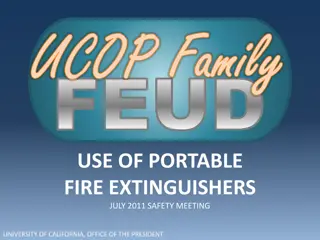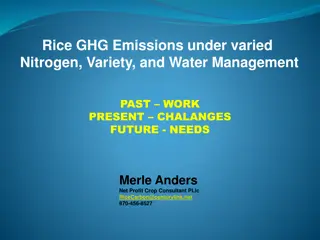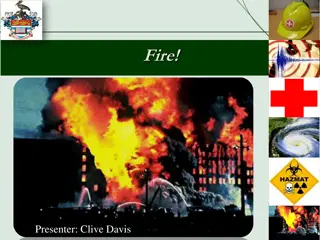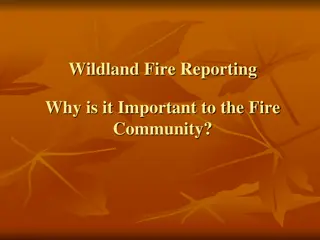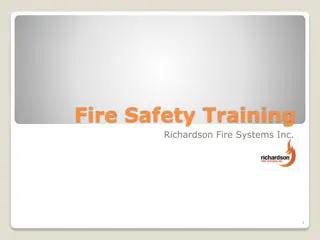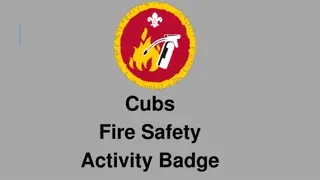A Corporate Accounting And Reporting Standard
Principles and guidelines for preparing GHG emissions inventories, focusing on organizational boundaries, operational boundaries, tracking emissions over time, calculating emissions, and reporting GHG emissions. It emphasizes relevance, completeness, consistency, transparency, and accuracy in accoun
1 views • 14 slides
A Corporate Accounting and Reporting Standard
This training curriculum covers principles of GHG accounting, organizational boundaries, setting operational boundaries, tracking emissions over time, calculating emissions, and reporting GHG emissions. It emphasizes the importance of determining which company operations and emissions sources to inc
2 views • 25 slides
Tradeoffs Between Water Savings and GHG Emissions in Irrigated Agriculture
This study examines the tradeoffs between water savings, economic impact, and greenhouse gas emissions resulting from technological changes in the irrigation industry. Key objectives include estimating water savings for different crops, quantifying GHG emissions from new irrigation technologies, and
0 views • 24 slides
Understanding Consumption-Based Emissions Inventories in Boulder County
Consumption-Based Emissions Inventories (CBEIs) play a crucial role in assessing greenhouse gas emissions linked to local consumption patterns. By calculating emissions associated with products and services used by a community, CBEIs reveal significant gaps in traditional emissions tracking, emphasi
2 views • 13 slides
Fire Safety Training for Developmental Disabilities Support Professionals
A comprehensive training partnership between the New York State Office for People with Developmental Disabilities (OPWDD) and the Division of Homeland Security and Emergency Services Office of Fire Prevention and Control (OFPC) focusing on fire safety. The course covers understanding the effects of
3 views • 38 slides
Understanding Passive Fire Protection in Buildings
Learn about the fundamentals of fire doors, passive fire protection, and the legal obligations surrounding fire safety in buildings. Discover the importance of compartmentation, fire door inspection, and implementation strategies within organizations. Gain insights into the role of passive fire prot
4 views • 39 slides
Fire Starters & Tinder Mastering Fire: Essential Fire-Starting Gear
Fire is essential to survival, especially when you are outdoors. Keeping warm and cooking, both, primarily depend on being able to start a fire. Aligning this necessity with our inventory, Survival Supplies Australia has all the fire making tools you may need at home, or on your next expedition. A d
0 views • 1 slides
Importance of Fire Safety Education in Preventing Home Fires
Attitudes and education play a crucial role in shaping people's perceptions of fire safety. Many individuals overlook the importance of fire safety, assuming it won't happen to them. However, the reality is that fires can occur quickly, especially with modern home construction materials. This emphas
0 views • 16 slides
CERT Basic Training for Fire Safety and Utility Controls
Learn the essential skills and knowledge for Community Emergency Response Team (CERT) members in Unit 2 of Basic Training. Explore topics such as fire chemistry, hazard identification, fire suppression techniques, and reducing electrical hazards. Discover the role of CERTs in fire safety, priorities
0 views • 33 slides
IPCC Inventory Software Enhancements for Waste Sector Emissions Estimation
Explore the latest enhancements in the IPCC inventory software related to waste sector emissions estimation. Major updates include subnational disaggregation, Tier 3 methods, wetlands supplement, and improvements in worksheet structure and layout. The software allows for detailed estimation of green
1 views • 10 slides
Essential Fire Fighting Equipment Onboard Ships
Ships are equipped with essential fire-fighting equipment such as fire pumps, hydrants, hoses, extinguishers, and more. Fire pumps play a crucial role in supplying water at high pressure to the sprinkler system. Fire hydrants provide access to water for firefighting, while fire extinguishers are use
0 views • 7 slides
Operating Room Fire Safety Guidelines
Response to operating room fires should be immediate. It is a shared responsibility of the surgical team to prevent fires by conducting annual fire safety education, following evacuation policies, and assessing fire risks in the OR. The AORN Fire Triangle highlights the elements necessary for a fire
1 views • 21 slides
Fire Suppression Training Manual for Motorboat Licensing
This manual covers essential information on fire suppression for motorboat training, testing, and licensing. It outlines fire classes, fuel sources, procedures for handling boat fires, legal requirements for fire extinguishers, and more. The manual also details the types of extinguishing agents, fir
0 views • 15 slides
Transforming Agriculture for Climate Change: Kirsten Beddows' Vision
Kirsten Beddows, Head of Agriculture Transformation, shares an updated Climate Change Plan focused on reducing emissions, achieving net-zero by 2045, and creating sustainable farming practices. The plan includes over a hundred new policies targeting emissions reduction, land use optimization, and ca
0 views • 9 slides
Understanding Fire Risks and Policies in Insurance Industry
This content provides valuable insights into fire insurance policies, the All India Fire Tariff, and the various perils covered under fire insurance. It explains the key features, exclusions, and applicability of fire insurance in different scenarios, helping readers understand the importance of mit
2 views • 39 slides
Emissions Reductions Beyond the Clean Smokestacks Act (CSA) Overview
Emissions Reductions Beyond the Clean Smokestacks Act (CSA) is a comprehensive program aimed at improving air quality by imposing limits on pollutant emissions from coal-burning facilities. The act has successfully achieved significant reductions in nitrogen oxide (NOx) and sulfur dioxide (SO2) emis
1 views • 12 slides
Comprehensive Guide to Fire Safety Measures and Prevention Tips
This detailed guide covers essential aspects of fire safety, including theory of fire, classes of fire, prevention tips, detection and alarm systems, fire suppression methods, types of extinguishers, and more. Learn about different classes of fires, prevention measures like using designated areas fo
0 views • 22 slides
Enhancing Oil and Gas Emissions Estimates for Area Sources
This presentation by Michael Ege, an Emissions Inventory Specialist at the Texas Commission on Environmental Quality (TCEQ), focuses on improving area source oil and gas emissions estimates. It covers the methods used to estimate emissions, including the development of basin-specific equipment profi
0 views • 31 slides
Essential Firefighting Equipment on Ships
Shipboard fires are a significant risk due to high temperatures and flammable materials. To prevent and combat fires effectively, ships are equipped with fire retardant bulkheads, fire doors, fire dampers, fire pumps, fire main piping and valves, as well as fire hose and nozzles. These essential fir
0 views • 18 slides
vFireLib: Forest Fire Simulation Library on GPU
Dive into Jessica Smith's thesis defense on vFireLib, a forest fire simulation library implemented on the GPU. The research focuses on real-time GPU-based wildfire simulation for effective and safe wildfire suppression efforts, aiming to reduce costs and mitigate loss of habitat, property, and life.
0 views • 95 slides
Fire Safety in Auto Repair Shops: Prevention and Preparedness
Auto repair shops face high fire risks due to the presence of flammable materials like volatile organic compounds. This material provides guidance on fire prevention plans, communication, training, fire suppression systems, emergency action plans, and identifying/mitigating fire hazards. Learn from
0 views • 32 slides
Overview of Air Emissions and Quality Assessment in Shale Gas Development
The presentation discusses the estimation of air emissions from shale gas development and production in North Carolina, highlighting the importance of analyzing emissions from oil and gas activities and associated truck traffic. The process involves building emissions inventory, photochemical modeli
0 views • 22 slides
Integrated Assessment of Terrestrial ECV Impact in MPI-ESM
Utilizing CCI fire and soil moisture observations to optimize fire model parameters in MPI-ESM. The study focuses on deriving functional relationships to enhance accuracy in predicting fire CO2 emissions and their impact on atmospheric CO2 concentrations compared to CCI GHG data. JSBACH-SPITFIRE fir
0 views • 7 slides
Regional Fire Inventory Data Collection and Analysis Framework
This comprehensive document outlines the data elements, calculation stream, and procedural steps required for WESTAR-WRAP agencies to contribute to the regional fire inventory. It covers aspects such as event reporting, emissions verification, fire type characteristics, fuel information, consumption
0 views • 8 slides
Comprehensive Framework for Fire Emissions Inventory Data Elements Calculation
This document outlines a detailed framework for calculating fire emissions inventory data elements, covering aspects such as location, dates, data sources, fuel characteristics, consumption mass pollutants, emission factors, and emissions. It emphasizes the importance of data quality, consistency, a
0 views • 4 slides
Greenhouse Gas Emissions Management in Warehouse Operations
The SQAS Assessor accreditation training in April 2022 focused on measuring and reducing greenhouse gas emissions in warehouse operations. The content covers emission questions, scope of emissions, energy consumption examples, disaggregation of emissions, emission intensity calculation, and strategi
0 views • 17 slides
Retirement Home Fire Safety Incident Report
A retirement home regulated under the Retirement Home Act, 2010 experienced a fire safety incident involving smoke alarms and evacuation procedures. The fire safety plan, approved in 2012, is under review. During a fire drill in 2014, a tenant failed to notify staff, resulting in a delayed response.
0 views • 20 slides
Fire Safety Training and High-Rise Building Facts
Fire safety training covers essential topics like fire alarms, fire warden roles, evacuation procedures, and more. High-rise building facts include features like full sprinkler systems, security measures, and fire separation. Understanding fire alarm causes, responses, and evacuation protocols are c
0 views • 31 slides
Exploring Fire and the Sagebrush Ecosystem
Delve into the dynamics of fire in the sagebrush ecosystem, where fire can spread rapidly, impacting both the landscape and wildlife. Learn about fire management strategies, the role of wildland firefighters, and efforts to create fire-adapted communities. Discover the importance of restoration in m
0 views • 12 slides
Comprehensive Fire Warden Training Guide
Comprehensive fire warden training guide developed by Travis County Emergency Services District 2 for self-guided training purposes. Covers the importance of emergency evac plans, fire dangers and characteristics, fire safety systems, volunteer fire warden functions, and more. Emphasizes the importa
0 views • 13 slides
Understanding Emissions Inventory for Air Quality Management
Emissions inventory plays a crucial role in monitoring air pollutant discharges and assessing air quality. This article discusses the purpose of emissions inventory, distinguishing between actual and permitted emissions, and provides guidelines for preparing and reporting minor source emissions inve
0 views • 15 slides
Monitoring Unexpected Emissions of Controlled Substances for Ozone Protection
The atmospheric science community plays a crucial role in identifying, quantifying, and communicating unexpected emissions of controlled substances to support the goals of minimizing future ozone depletion and upholding the Montreal Protocol. By comparing observation-based estimates of global emissi
0 views • 13 slides
Managing Farmland Nitrogen Emissions: Strategies and Research Updates
Soils play a crucial role in greenhouse gas emissions and carbon sequestration. Karl Richards, Head of Soils, Environment & Land-Use Department at Teagasc, discusses the importance of managing farmland nitrogen emissions through various practices. Research focuses on reducing emissions and enhancing
0 views • 8 slides
Understanding Fire: Elements, Extinguishing Methods, and Safety Measures
Explore the essential elements for a fire to exist, learn about the Fire Triangle, understand the classes of fires, and know which fire extinguisher types are suitable for different fuel sources. Discover practical steps to take in case of a fire emergency and how to safely operate a fire extinguish
0 views • 11 slides
Portable Fire Extinguisher Training and Guidelines
Annual portable fire extinguisher training is mandatory to comply with Cal/OSHA regulations. The training covers general principles of fire extinguisher use, when to use a portable fire extinguisher, and examples of different types of fires (Type A, B, C). It also outlines conditions when using a fi
0 views • 21 slides
Rice GHG Emissions under Varied Nitrogen, Variety, and Water Management Study in Arkansas
Detailed study on rice greenhouse gas emissions under varied nitrogen, variety, and water management treatments, focusing on nitrogen fertility, crop varieties, and water usage impact on methane and nitrous oxide emissions. Research examines optimal nitrogen rates for reduced global warming potentia
1 views • 18 slides
Fire Safety Presentation by Clive Davis - Tips, Prevention, and Equipment Overview
Enhance your fire safety knowledge with Clive Davis' comprehensive presentation covering fire prevention tips, classes of fire, detection and alarm systems, suppression equipment, and various types of fire extinguishers. Learn about fire safety measures, prevention techniques, and essential protocol
0 views • 23 slides
Importance of Wildland Fire Reporting to the Fire Community
Wildland fire reporting plays a critical role in providing accurate data for effective fire management. Defined state fires and challenges in reporting impact funding, risk management, and agency support. Comprehensive reporting like the Wildland Fire Occurrence Reporting for Massachusetts is essent
0 views • 6 slides
Fire Safety Training and Implementation Guidelines
This document outlines the responsibilities and duties of various staff members, including fire safety training, fire warden roles, and the implementation of a fire safety plan. It emphasizes the importance of knowing and understanding the fire safety plan, participating in fire drills, and maintain
0 views • 29 slides
Fire Safety Tips for Cubs and Families
Explore essential fire safety activities for Cubs, including earning badges, virtual fire station tours, practicing fire drills, planning escape routes, maintaining smoke detectors, identifying potential home dangers, and learning safety rules for fire incidents. Encourage a proactive approach to fi
0 views • 15 slides

